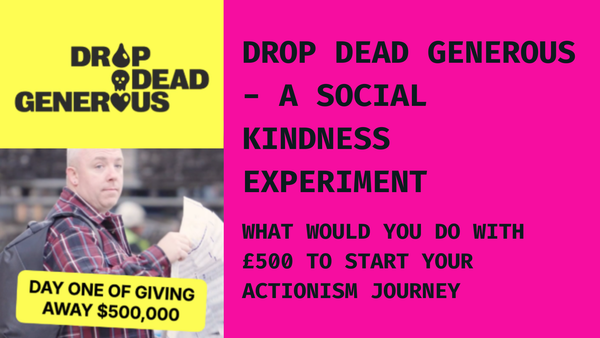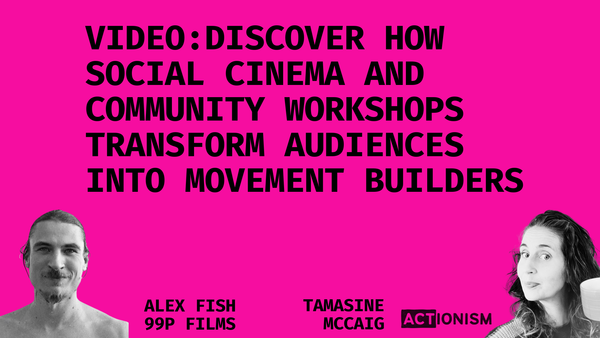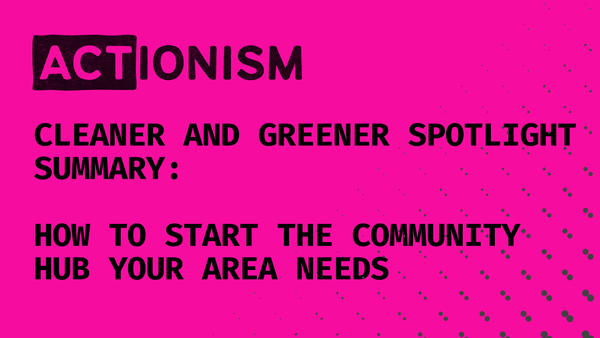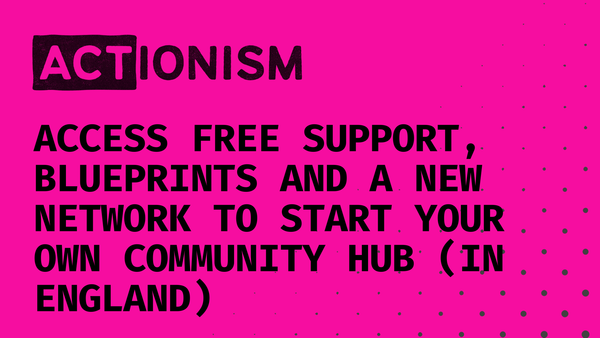Finding the Others: On Feeling, Listening & Building Collective Action
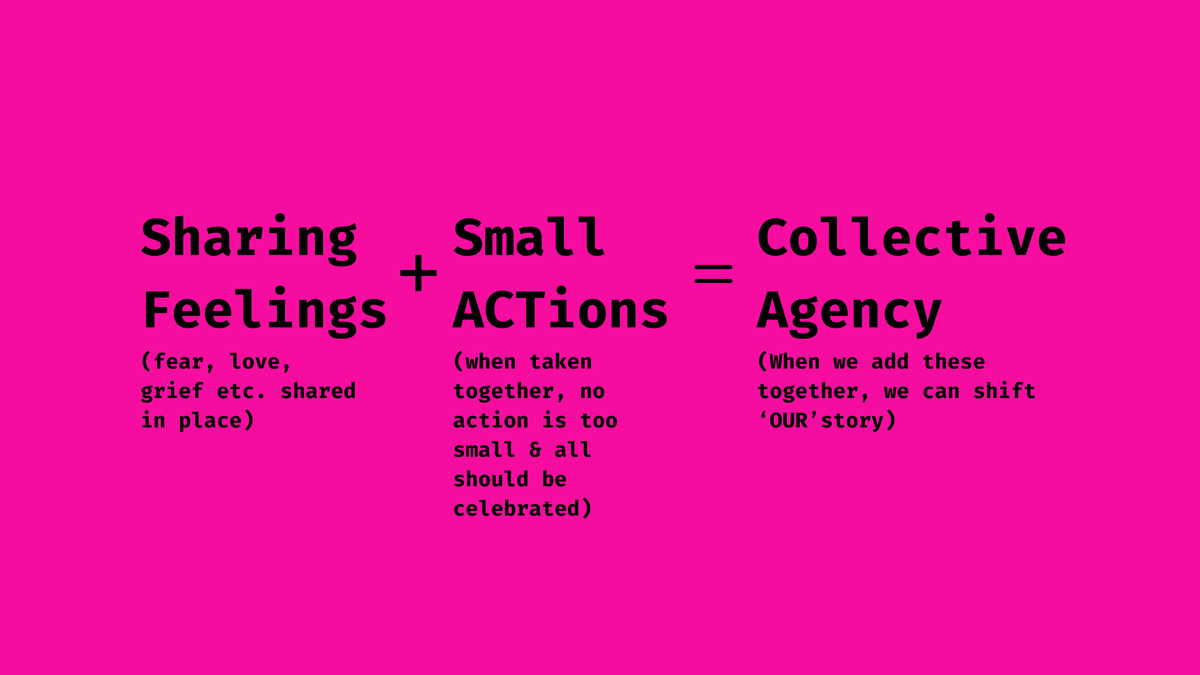
Fellow traveller, Heather Davies recently wrote about a BBC Academy event, with neuroscientist Kris De Meyer. Kris reminded us, that you can’t reliably drive action by trying to generate fear, guilt or anger in others. Emotions manipulated often backfire, polarising people, causing overwhelm, or shutting down possibility.
Instead, he shared the insight many of us already live: action leads to belief. Taking steps, even small ones, with others builds agency, meaning, momentum.
That’s why I find Tamasine’s approach here on the ACTionism platform so powerful. Sharing simple, grounded actions, clear do-able steps, rooted in real examples, is an invitation. It’s not just “look what we’re doing,” it’s: you can do this too.
And that’s one of the strongest routes to collective agency I’ve seen, quietly building momentum, one honest action at a time.
I believe strongly that action leads to belief. My experience with ACTionism, Re-Action, and other community movements has shown me that connection through action is how change begins, and how it grows. The result is that I have a believe in my fellow humans and the power of collective action.
But I also find myself wondering: is there still a role for emotions, fear, hope, anger, grief, in our work? And how?
I think the answer lies not in using those emotions as tools, but in honestly naming them as part of our shared experience.
Naming what we feel = Inviting others in
When I say,
“I feel ashamed about how I’ve lived, and the impact it’s had on the more-than-human world, the way I have, knowingly or not, 'othered' nature. At times I have treated it as something separate from me, something to use rather than belong to. And, how even now, I continue to do this, as I'm trapped in a system."
And,
I’m scared. The speed at which climate change is unfolding feels palpable where I live. It’s not abstract, it’s in the changing seasons, the shifting weather, the collapse in biodiversity.”
I’m not trying to shame others.
I’m not trying to make citizens feel bad or guilty.
I’m simply speaking my truth.
And in doing so, I open space for someone else to say,
“Yes… I feel that too.”
That “me-too” is a bridge, and an opening: it’s the moment where isolation gives way to shared ground. That is where connection begins. When emotions are expressed not as weapons (to provoke shame or fear), but as vulnerable truths, they invite resonance, not defensiveness.
It’s an invitation, to feel, to reflect, and to stand together. Whether it’s sharing a feeling or offering a slice of cake, bridges to connection are built through small, disarming acts of honesty and care.
When people feel they aren’t alone in what they feel, they begin to lean in. They begin to trust that together, they can act, not out of coercion, but out of belonging, curiosity, and care.
I live in a tiny village in the French Alps, a place where the landscape itself can be isolating. And for a long time, I did feel isolated. But since I began sharing my feelings, honestly, without trying to persuade or perform, alongside taking action, I’ve been able to build real bridges with others. Now, that isolation has given way to connection.
So yes: I think emotions still matter. But only when we speak them from our own hearts and guts, not project them onto others.
Why we’re leaning more into in‑person events
That’s why at ACTionism, we’re increasingly committed to meeting in real, physical spaces, through listening events, workshops, film screenings, and creative practice, because it’s there that safe space for speaking and truly listening can be created.
Online can do many things well, but the real work, the kind that shifts how someone feels in their body, is hardest to host virtually.
In person, we can:
- Hold a circle where people sit with their feelings
- Invite spontaneous creative responses (poetry, movement, sound, sewing, art)
- Use shared silence, eye contact, gesture
- Offer trust, witness, mutual accountability
These are the conditions for emotional honesty. And once people have spoken deeply, the rest of the work (conversations, decisions, action) lands differently.
A Workshop that Landed: ACTionism x Pol.is
At a recent ACTionism event, I ran a workshop near the end: “ACTionism x Pol.is: Can we build better Conversations about change?”
Earlier in the weekend, we created space for people to share their feelings: frustration, grief, hope, doubt. We even lay on the forest floor together, deepening our connection to nature, which helped open those emotional channels. By the time we reached the Pol.is exercise, I felt that the emotional groundwork had been laid, and the group was truly ready.
We took statements generated via Pol.is (the machine-learning democracy tool) and brought them into a live conversation. People physically placed themselves along a line from “Strongly Agree” to “Strongly Disagree,” then paired off with citizens at different positions. It wasn’t debating. It was listening, reflecting, exploring tension.
Because people had already built relationships, and named some of their internal emotional states, the exercise landed safe, grounded, generative. It became a pathway toward shared insight, not conflict.
It massively shifted me, in fact the whole weekend did.
This transformation inspired me to write The Dance of Collective Action: From Passive Consumers to Active Citizens, where I explored how small, intentional dance moves can lead to meaningful collective action.
In this piece, the first “dance move” I describe on the journey is about embracing emotion and sharing openly. It’s about creating spaces where we can express our feelings, frustration, hope, grief, joy, and truly be heard. This kind of emotional honesty forms the very foundation of collective agency.
But beyond just sharing emotions, what happens next is even more crucial. The trust and bonds that are built between people in these spaces become the bedrock for collective action. When we listen deeply and vulnerably, we forge connections that go beyond surface-level agreement. These connections create a sense of safety and solidarity, empowering us to take risks and work together toward shared goals.
In my experience, ACTionism’s in-person gatherings, like the Weekender, provide the fertile ground where this trust can grow. It’s here that individual voices come together, and collective power takes root.
Why ACTionism Matters
That’s why I believe that what we’re doing at ACTionism is powerful. We’re creating safe spaces for sharing feelings, offering simple actions, and doing it all from a place of togetherness.
We’re also not 'othering', and that’s essential. Because it’s in that refusal to divide that we begin to honour our deep interconnectedness, with each other and with the more-than-human world.
To me, ACTionism is truly beginning to feel like a movement, one where we're putting down roots of lasting cultural change.
And, I think that change begins with sharing our emotions and taking small actions.
An Idea
So here’s what I’m offering, and asking:
- Let's ACT so that we build belief
- Let's celebrate small actions.
- Let’s stop using emotion as a lever.
- Let’s begin with honesty: I feel these things.
- Let’s listen, not to convert, but to connect.
- Let’s build events and community spaces, for conversations that make space for those feelings.
- And from that soil, let’s collective agency.
In a time of climate crisis and social violence, it’s tempting to push people forward with fear and urgency. But we must build the trust, the safety, the shared ground.
Because when someone says, “I feel this too,” and someone else hears it, something cracks open. Something shifts.
And that is how collective action begins.

